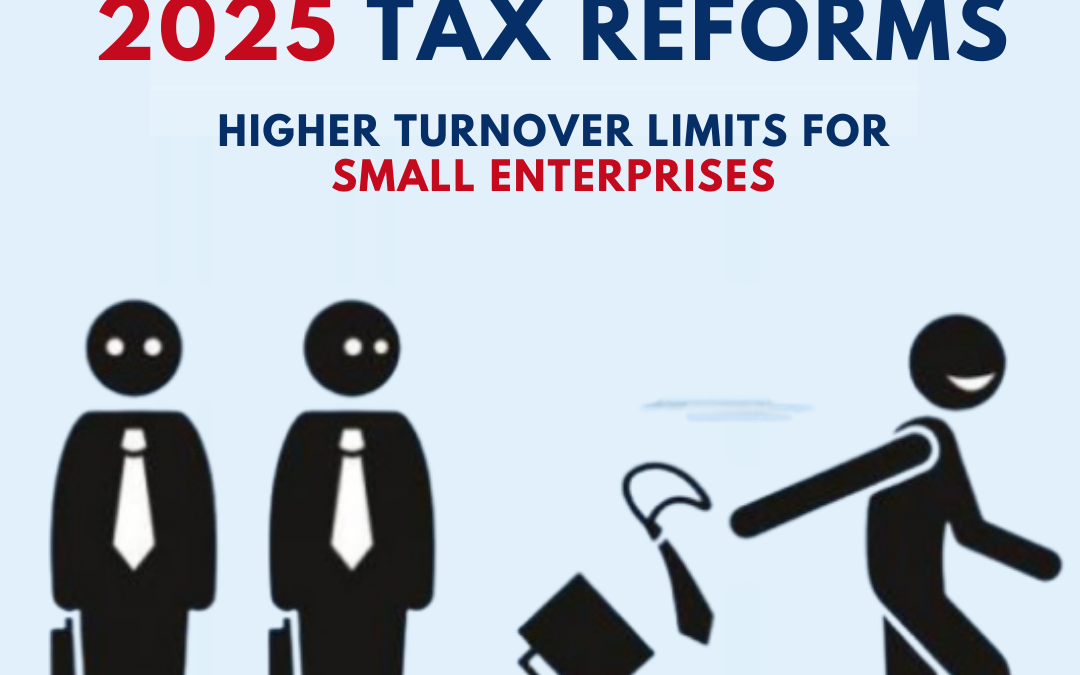
Tax Tips for Entrepreneurs: The Best Tax-Saving Tips for 2025
March 18, 2025
Germany Raises VAT Registration Thresholds for Small Businesses in 2025
April 11, 2025Significant Tax Change for Small Businesses in 2025
With the 2024 Annual Tax Act, a significant development has been introduced for small business owners, bringing forth a comprehensive reform of the small business regulation related to VAT, as specified under Section 19 of the German VAT Act (UStG). These newly revised tax laws will officially come into effect starting January 1, 2025. This update is part of a broader effort to streamline tax obligations and offer more flexibility and financial relief to small businesses operating within Germany.
Current Small Business Tax Rules
As per the current regulations, entrepreneurs who qualify as small businesses under Section 19 UStG are not permitted to charge VAT on their invoices for any goods or services provided. Furthermore, they are also not eligible to claim input tax refunds on their business-related expenditures. Presently, this classification applies when a business’s turnover in the previous year remains below €22,000 and is projected not to exceed €50,000 in the current year. These limitations have historically posed challenges for growth and scalability among small enterprises.

Updated Turnover Limits from 2025
From January 1, 2025, the thresholds defining small business status will be adjusted upwards to better align with modern economic conditions and support business growth. Specifically, the previous year’s domestic turnover must not exceed €25,000, while the turnover for the current year must not surpass €100,000. This increase in turnover limits is designed to provide broader access to VAT exemptions, allowing more businesses to benefit from the simplified tax regulations. Entrepreneurs who recorded turnover below €25,000 in 2024 and anticipate staying below €100,000 in 2025 will qualify under the revised small business regulation.
Exceeding the Turnover Limits
According to the provisions set out in the 2024 Annual Tax Act, if a business’s turnover in the current year exceeds the €100,000 threshold, the small business regulation ceases to apply immediately. The business must begin charging VAT from the exact point in time when the turnover surpasses €100,000, with no possibility of retroactive application of the small business status. For newly established businesses, the initial turnover must remain under €25,000 for small business classification. If the turnover crosses this mark, VAT must be applied only to the amount exceeding €25,000, with all previous transactions remaining exempt from VAT.
EU-Wide Small Business Regulation from 2025
Beginning in 2025, small business taxation rules will be harmonized across the European Union’s single market. This means that German small businesses may apply small business taxation rules in other EU member states, provided they meet specific criteria and submit a quarterly turnover declaration. In parallel, businesses based in other EU countries can also benefit from Germany’s small business regulations if they fulfill the relevant requirements. This EU-wide approach to small business taxation aims to simplify cross-border commerce and reduce administrative burdens for small enterprises operating in multiple countries.
E-Invoicing Obligations for Small Businesses
Although it is not a direct tax reform, the 2024 Annual Tax Act includes important provisions regarding electronic invoicing. As of January 1, 2025, small businesses are exempt from the obligation to issue e-invoices. However, it remains mandatory for them to be capable of receiving e-invoices. For additional details on how to manage electronic invoicing efficiently, small business owners can refer to our comprehensive guide, “E-invoicing made easy with Lexware,” which offers step-by-step support.

Tax-Free Status for Photovoltaic Systems
Starting January 1, 2025, photovoltaic systems installed on any type of building with a total capacity of up to 30 kW (peak) will be exempt from income tax under Section 3 no. 72 EStG. This exemption previously applied only to certain building categories and systems with a maximum capacity of 15 kW (peak). The cumulative capacity threshold remains at 100 kW (peak) per taxpayer or co-entrepreneur, ensuring that individuals and businesses can invest in sustainable energy solutions with favorable tax implications.
Input Tax Flat Rate for Farmers and Foresters Reduced
Farmers and foresters will experience a reduction in the input tax flat rate, with the rate set at 8.4% for the remainder of 2024. From the start of 2025, this rate will further decrease to 7.8%. This change reflects the government’s intention to provide more precise and fair taxation in the agricultural and forestry sectors.
VAT Actual Taxation Changes (Effective 2028)
Entrepreneurs whose annual turnover falls below €800,000 can apply for actual VAT taxation. Under this system, VAT becomes payable only when payments are received, offering improved cash flow management. From 2028, it will become mandatory to indicate actual taxation status on invoices, and input tax deductions can only be made once payment has been received.
Construction Withholding Tax: Mandatory Electronic Application
Effective January 1, 2026, all applications for refunds related to construction withholding tax must be submitted electronically. This move is intended to enhance efficiency and reduce paperwork in the construction sector’s tax processes.
Extended Tax Return Deadlines with Tax Advisor
For the 2024 tax year, the deadlines for submitting tax returns are as follows: July 31, 2025, for individuals and businesses not utilizing a tax advisor, and April 30, 2026, for those who employ the services of a tax advisor. These extended deadlines are designed to provide ample time for accurate tax preparation and submission.
Expiry of the Inflation Compensation Bonus
The option for employers to provide a tax-free inflation compensation bonus of up to €3,000, which was available between October 26, 2022, and December 31, 2024, has now ended. This benefit will not be extended into 2025 and beyond, marking the conclusion of this one-time fiscal relief measure.

Non-Cash Remuneration Values for 2025
As per the “Fifteenth Ordinance Amending the Social Security Remuneration Ordinance,” the non-cash remuneration values for 2025 have been updated. For meals, the value is set at €333 per month, with €2.30 per day for breakfast and €4.40 per day for lunch or dinner. For accommodation, the value is €282 per month or €9.40 per day.
Retroactive Increase in Basic Tax-Free Allowance
Effective from January 1, 2024, the basic tax-free allowance has been retroactively increased to €11,784, up from the previous amount of €11,604. Looking ahead to 2025, this allowance will rise further to €12,096. For married couples, the amount will be double, offering substantial tax relief to households.
CO₂ Tax Increase for 2025
The CO₂ tax will experience an increase from €45 to €55 per tonne starting in 2025. This applies to carbon-intensive energy sources such as natural gas, heating oil, petrol, and diesel, and is part of broader environmental taxation efforts aimed at reducing carbon emissions.
Bureaucracy Relief Act Tax Changes for 2025
Implemented in October 2024, the Bureaucracy Relief Act introduces several tax-related measures to simplify compliance. Document retention requirements are reduced from 10 years to 8 years. The threshold for advance VAT returns is increased to €9,000, allowing businesses below this limit to file quarterly instead of monthly returns. Additionally, the de minimis threshold for the margin scheme is raised from €500 to €750, easing the burden on small transactions.

Tax Deductions for Private Sector Entrepreneurs
Maintenance Payments
Under Section 33a (1) EStG, private sector entrepreneurs providing financial support to children (not eligible for child benefit) or to their parents can deduct up to €12,096 from their taxable income in 2025. Starting in 2025, only bank transfers will be accepted as proof of these payments; cash payments will no longer be valid for tax deduction purposes.
Higher Commuting Allowance for People with Disabilities
Entrepreneurs or employees who have at least a 50% disability along with a “G” disability mark, or who have a 70% disability, can benefit from higher commuting allowances. They may deduct the actual commuting expenses incurred or opt for a flat rate of €0.30 per kilometer for round-trip travel between their residence and primary place of work or business operations.
Final Thoughts on 2025 Tax Changes
The 2024 Annual Tax Act brings a broad spectrum of changes affecting small businesses, ranging from updated VAT regulations and e-invoicing requirements to new thresholds and tax relief measures. By understanding and preparing for these developments, small business owners can position themselves to take full advantage of the benefits and ensure compliance with the updated legal framework from 2025 onwards.

